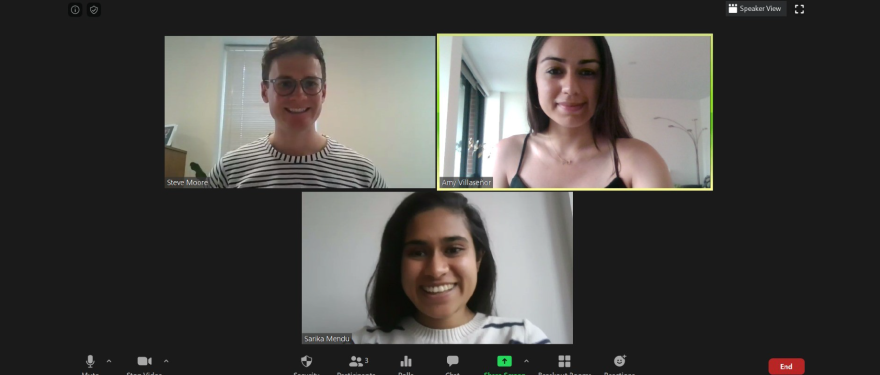“We as MBA students have a voice and with that a duty to make the voices of those most-vulnerable heard.” Amy, Sarika, and Steve (HBS 2020) watched in awe as signatures reached over 1,200 within a few days supporting the open letter they’d written to Fortune 500 CEOs. The idea for the letter was born just three weeks earlier on a Zoom call with their Public Entrepreneurship professor Mitch Weiss. Along with about 15 fellow classmates, they expressed feelings of helplessness for the world around them.
On the call, I recounted a story I heard about a bank branch manager who told employees that having a fever was no reason to miss work. The branch was allowing employees paid time off only if they tested positive for COVID-19. At that point in time, testing was extremely scarce, so it was practically impossible for those employees to get tested. Some were the sole breadwinners for their families, so they were forced to choose between not putting food on the table and getting their families or others sick. It felt unfair that these large corporations were getting away with being this irresponsible. It felt even more unjust that when employees told their stories, it was not enough to get them the help they needed.
At that moment, our professor suggested that I do some more digging and write an op-ed to elevate the voices I had been hearing. He reminded us that one day we may be looking to work at the companies that are not currently living up to our own personal values. He reminded us of the importance of remembering this in the future. Sarika and Steve, who are also my section-mates, were on the same call. They too believe that fair employee treatment is something companies should make a top priority and that’s how our team was born.
Writing the letter was a learning process for the three of us. We were extremely thankful for the support that we received from our professors, HBS, as well as the Harvard and MBA communities. Professor Ryan Buell, who teaches Managing Service Operations, responded to our requests for feedback no matter how late at night we emailed him and still jumped on calls with us early the next morning. Our professors also connected us with their work and research. For example, Buell’s research helped us think through the connection between COVID-19 and how “even in the best of times, customers reward organizations that do right by their employees.” Professor Ethan Rouen, like several other HBS professors we had the pleasure of working with, connected us to resources such as Just Capital’s COVID-19 corporate response tracker to aid in our fact-gathering process. We were especially grateful to them because we were aware of the intense move-to-online training all HBS faculty were undergoing, yet they never missed a beat in lending us a helping hand.
In the month and a half after that first call, we sent the letter to Fortune 500 CEOs who are also HBS alumni. Even the ease with which we were able to acquire their contact information proved to us why we needed to use our voice. The letter continues to gather signatures organically, which is something we welcome. Today, ten years after the MBA oath was first launched at HBS during the financial crisis, we find ourselves in another crisis. We feel it is more important than ever to live out the values of the Oath, and this letter is one small way we can all do so.
Next, we are working on getting the letter published more widely. So far, it has been published in the Harbus and via a Poets & Quants editorial. We welcome opportunities for broader publication: because to us, we have succeeded if even one person is inspired by the letter.
“We as MBA students have a voice and with that a duty to make the voices of those most-vulnerable heard.” This was the resounding thought that mobilized the three of us to start gathering and sharing the stories of the unsung heroes of this crisis: front-line workers.

